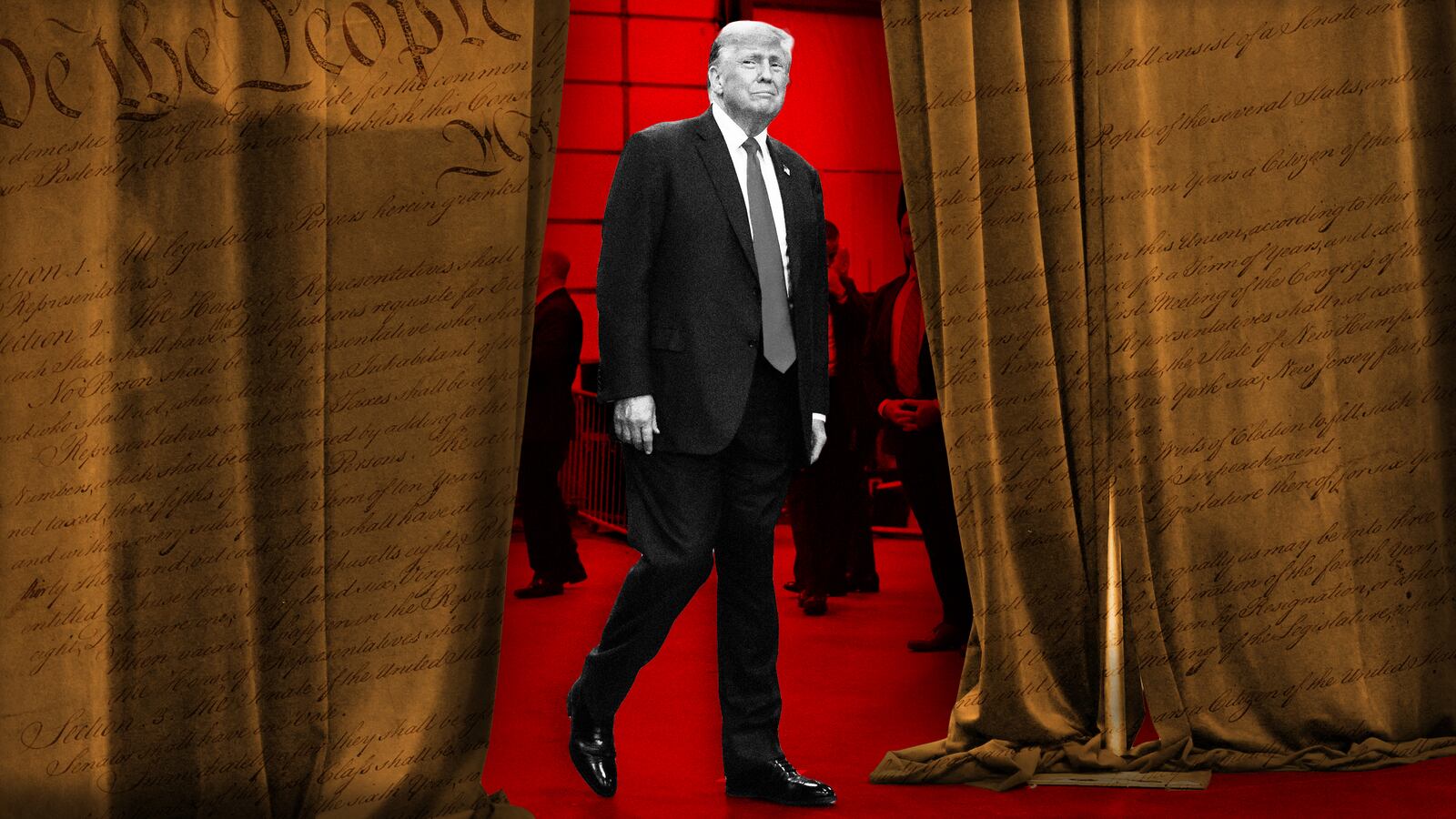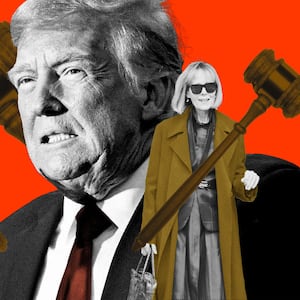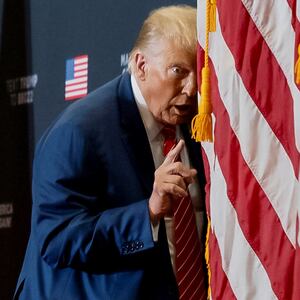The long-feared clash between Donald Trump and the U.S. Constitution is finally here, with several historic legal battles about presidential accountability and his unprecedented lawlessness all careening simultaneously toward the nation’s highest court—just as the 2024 primary election season begins.
On Tuesday, the former president is expected to make an exceedingly rare appearance in D.C. appellate court, where his lawyers will essentially argue he is above the law—untouchable by federal prosecutors over the way he tried to stay in power after losing the 2020 election.
Whatever the outcome, the matter is guaranteed to speed its way to the Supreme Court, which will inevitably determine whether Department of Justice Special Counsel Jack Smith can prosecute Trump for election interference at a criminal trial set to start in March. The similar but separate state racketeering case against Trump in Atlanta also hangs in the balance, depending entirely on whether justices bestow upon Trump—and any president—this new and unfettered power.

Former President Donald Trump speaks during a campaign event, in Clinton, Iowa.
Cheney Orr/Reuters“It’s part and parcel with authoritarianism. He wants to be above the law... so he doesn't go to jail,” said the lawyer George Conway, whose ex-wife, Kellyanne Conway, has served as a longtime political adviser to Trump.
Meanwhile, the remarkable decision by election officials in Colorado and Maine to yank Trump off the ballot in 2024 for his failed insurrection will now be reviewed by the Supreme Court, which will entertain lawyers’ arguments in Washington on Feb. 8. The highly unusual case will decide whether state bureaucrats can single-handedly employ the 14th Amendment to prohibit Trump from running for office, an untested ploy to avert the perceived threat of Trumpist authoritarianism.
The outcome could determine the fate of similar challenges in 19 other states, including the massive primary battleground states of Arizona, Florida, Texas, and Wisconsin.
Simmering in the background are two other cases that pose similarly significant questions about Trump’s unchecked power. One concerns Trump’s vindictive jailing of former lawyer Michael Cohen, who was thrown into solitary confinement by federal officers in a rushed effort to shut him up before the release of his tell-all memoir about the billionaire. The other deals with the way Trump used the White House podium to defame the journalist he has subsequently been determined to have sexually assaulted decades ago, E. Jean Carroll. Both have gone through New York’s 2nd Circuit Court of Appeals, but could still make their way up.
The timing of the maelstrom promises a messy start to the primary election season unlike any in the nation’s history.
On a phone call last week, legal scholars convened a press conference to discuss the rocky road ahead and warn about the peril that could follow if higher courts grant Trump the sweeping immunity and unchecked power he craves. Speaking about the D.C. appellate court’s current consideration of Trump’s attempted power grab, attorney Norman L. Eisen put it in stark terms.
“It may be the single most important question confronting our democracy this year,” Eisen said. “There is no absolute immunity to prosecution!”
Eisen, a former Obama White House ethics czar who later helped the House Judiciary Committee build the case for Trump’s first impeachment, warned that appellate judges will essentially determine if an American president has king-like powers. He and others on the call said they expect the D.C. Court of Appeals to quickly reject Trump’s attempt to assert that a president has blanket immunity for whatever they do while in office, but they acknowledged that it will merely be a step on the way toward the showdown’s unavoidable conclusion at the Supreme Court—where three of the nine justices were appointed by Trump himself.
Ty Cobb, the longtime Washington lawyer who spent nearly a year at the Trump White House, said he expects appellate judges to rule “quickly and forcefully.” And he’d like the appeal of the appeal to be rid of with similar speed.
“The Supreme Court could well decide to pass on the case. My preference would be that they summarily affirm without briefing or argument,” he said. “Speed matters here. A pyrrhic victory is one that takes two months.”
And that’s the other issue at play. Trump’s four upcoming criminal trials all depend, in some way or another, on the outcomes of these appeals. Blanket presidential immunity could eviscerate the D.C. and Atlanta cases. By contrast, a delay of the D.C. trial could delay the timing of the Stormy Daniels sexual affair coverup trial in Manhattan and the Mar-a-Lago classified documents trial in South Florida. And all of these trials could affect the decision of Republican voters choosing their nominee.
Fred Wertheimer, a campaign finance reform advocate who’s also a Washington legal staple, cautioned that any bump along the road that slows down these cases plays into Trump’s hand. And it’s clear that the former president is fully aware of that, he said, pointing to Trump’s constant attempts to tie the hands of federal prosecutors from inching their case along—evident by Trump’s empty complaint last week over the way that the feds keep turning over documents to his defense team in the D.C. case.
“This is part of Trump’s longtime strategy of delay, delay, and delay,” Wertheimer said.
The sweeping and fundamental nature of the present legal battles is clear from the language employed in the flurry of legal briefs that are now being filed daily in half a dozen cases across the country, with both sides claiming that the fate of the republic is at stake.
The same goes for the citations, with prosecutors and MAGA lawyers pointing to some of the earliest literature put together by the nation’s founders. Judges are being repeatedly directed to segments of Alexander Hamilton’s collection of pro-Constitution essays published in 1787 New York City newspapers, known as the Federalist Papers.
For example, Smith’s federal prosecutors have cited Federalist No. 77, which discusses executive powers and notes that a future president will be “at all times liable to impeachment, trial, dismission from office… and to the forfeiture of life and estate by subsequent prosecution in the common course of law.”
In response, Trump’s lawyers chose to impose significant weight on the word “subsequent,” arguing that the American thinker actually provided a very narrow band of options for holding a former president accountable.
“Hamilton states that prosecution must occur only after impeachment and conviction, not after leaving office upon the expiration of his term,” Trump lawyer D. John Sauer wrote in a court filing last week.
Similarly, higher court judges will have to take a closer look at Federalist No. 65, in which Hamilton laid out why Congress was better equipped to impeach and politically convict a president than the Supreme Court. Again, Trump’s lawyers load heavy significance on a single word, “after,” when Hamilton wrote about the shame of impeachment and the punishment of criminal conviction.
“After having been sentenced to a perpetual ostracism from the esteem and confidence, and honors and emoluments of his country, he will still be liable to prosecution and punishment in the ordinary course of law,” Hamilton wrote at the time.
However, the whole point of that 65th essay was to explain why the same entity, the Supreme Court, shouldn’t get two bites at the apple by handling an impeachment and criminal conviction—implying that one need not rely on the other.
“Would it be proper that the same persons who disposed of his fame, and his most valuable rights as a citizen, should, in another trial for the same offense, be also the disposers of his life and his fortune?” Hamilton wrote.
The careful reader will catch Hamilton’s reference to “the influence of any new lights which might be brought to vary the complexion of another decision,” which in today’s parlance would refer to the new evidence federal prosecutors plan to unveil at Trump’s upcoming criminal trial—details of his election interference efforts that weren't available when 43 Senate Republicans voted to acquit him in the weeks after the Jan. 6, 2021 insurrection.
During last week’s call among legal scholars and journalists, former Trump administration national security official Olivia Troye noted how “it would be prudent to hear from these Republican senators who voted to acquit him,” noting that some of them did so on the condition that the criminal justice system could take this up.
If ever there were a chance to limit the powers of the nation’s chief executive, this is it. In a recent interview with The Daily Beast, Michael Waldman, who leads the Brennan Center for Justice at New York University law school, noted that judges are engaging in a “balancing test” with severe consequences. A president must be free to make monumental decisions to secure the safety of the nation without fearing reprisals upon leaving office—but that shouldn’t include outright criminal behavior, he said.
“That would be bad for the country if it meant the president couldn't do their job,” he said. “But always underpinning this idea [of immunity] was that presidents could be prosecuted after leaving office for crimes they committed.”








